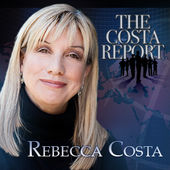With tax season in full-swing, millions of Americans have begun the arduous process of filling out their Federal and State returns. The IRS estimated that Americans spent six billion hours filing returns last year, which begs the question: is a 4 million-word Federal tax code full of new regulations and guidelines necessary?
Renowned publishing executive and two-time Republican Presidential candidate, Steve Forbes, believes it is not. “We need radical tax reform,” he says.
Forbes, who has long been a vocal advocate for the “Flat Tax,” joined The Costa Report to explain just how complex the current tax system has become. He says the 4 million-word code is the tip of the iceberg because it doesn’t take into account millions of additional pages of interpretations, analysis, legal rulings, and other data experts must navigate to comply with the law. According to Forbes, growing complexity has increased the number of errors reported. He pointed to a recent government investigation which discovered that agents who monitor the IRS Hotline were wrong 20-30% of the time, and the IRS taxpayer assistance program had a 61% error rate.
Forbes says the “current code is beyond redemption,” and strongly urges government leaders to adopt a “Flat Tax” system. When asked whether he would support a “Fair Tax,” which would replace income taxes with a higher sales tax, Forbes made the point that a “Flat Tax” on income is more feasible and fair than the proposed “Fair Tax.” He cited four reasons why the “Fair Tax” is problematic. First, the government would be required to raise sales taxes to a very high rate to make up for lost income and payroll tax revenues. According to Forbes, this would discourage consumer spending and cause the economy to suffer. Second, the government would need to institute a way of distinguishing business purchases from personal purchases, as businesses are taxed differently. (How would the government determine whether an individual purchased office supplies for their personal use, or for use in their business?) Third, the “Fair Tax” assumes the government would pay itself taxes on the purchases it makes. The government is one of the largest spenders in the economy â if it failed to pay itself a sales tax on its own purchases, there would be a shortfall in revenue. And finally, the 16th Amendment of the U.S. Constitution, which gives government the power to impose taxes, would allow Congress to institute a “Fair Tax” without completely eliminating the income and payroll tax. So, in order for the “Fair Tax” to work, the 16th Amendment would have to be repealed â a move Forbes says is unlikely.
On the other hand, the “Flat Tax” can be instituted with no repeal of a Constitutional Amendment. The “Flat Tax” would require all taxpayers to pay a single fixed-rate regardless of their income, “with generous exemptions for adults and children below a certain income level.” Forbes points out that “A family of four, for example, would pay NO federal income tax on their first $52,000 in wages.”
On the business side, Forbes proposes cutting the current tax rate from 35% to 17%, a move he says will help revitalize the American economy. “When you have high income tax rates, you don’t get the kind of investment that is necessary for a productive economy,” claimed Forbes. “What a flat tax does … is it does not punish productive work, risk taking, or success.”
To listen to the full interview with Steve Forbes HERE.







